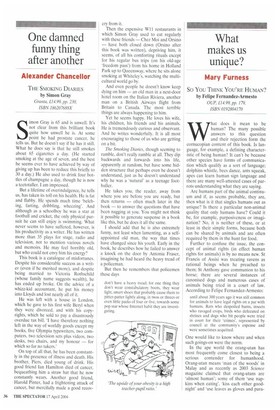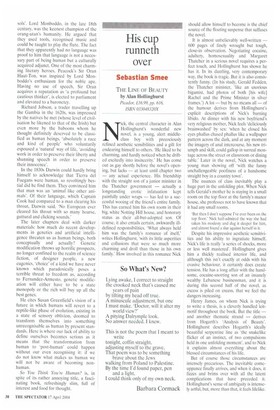What makes us unique?
Mary Furness
So You THINK YOU'RE HUMAN? by Felipe Fernandez-Armesto OUP, £14.99, pp. 179, ISBN 0192804170 What does it mean to be human? The many possible answers to this question and their rejection form the cornucopian content of this book. Is language, for example, a defining characteristic of being human? It can't be because other species have forms of communication which qualify as a sort of language; dolphins whistle, bees dance, ants squeak, apes can learn human sign language and there are many well-attested cases of parrots understanding what they are saying. Are humans part of the animal continuum and if, as seems probable, they are, then what is it that singles humans out as unique? Is there a particular non-animal quality that only humans have? Could it be, for example, purposiveness or imagination? No, it is neither of these, or at least in their simple forms, because both can be shared by animals and are often required by them in the hunt for food.
Further to confuse the issue, the concept of animal rights (in effect human rights for animals) is by no means new. St Francis of Assisi was treating ravens as rational beings when he preached to them; St Anthony gave communion to his horse; there are several instances of canonised dogs and numerous cases of animals being tried in a court of law. According to Felipe Fernandez-Armesto:
until about 300 years ago it was still common for animals to have legal rights on a par with humans. Rats who despoiled barns, insects who ravaged crops, birds who defecated on shrines and dogs who bit people were tried in court for their 'crimes', represented by council at the community's expense and were sometimes acquitted.
One would like to know where and when such goings-on were the norm.
In the ape world the orang-utan has most frequently come closest to being a serious contender for humanhood. Orang-utan means 'man of the woods' in Malay and as recently as 2003 Science magazine claimed that orang-utans are 'almost human'; some of them 'use napkins when eating', 'kiss each other goodnight' and 'use leaves as gloves and para
sols'. Lord Monboddo, in the late 18th century, was the keenest champion of the orang-utan's humanity. He argued that they used tools, recognised music and could be taught to play the flute. The fact that they apparently had no language was proof to him that language is not a necessary part of being human but a culturally acquired adjunct. One of the most charming literary heroes, Peacock's Sir Oran Haut-Ton, was inspired by Lord Monboddo's enthusiasm for the noble ape. Having no use of speech, Sir Oran acquires a reputation as `a profound but cautious thinker', is elected to parliament and elevated to a baronetcy.
Richard Jobson. a trader travelling up the Gambia in the 1620s, was impressed by the natives he met (whose level of civilisation he likened to that of the Irish) but even more by the baboons whom he thought definitely deserved to be classified as human beings, `absolutely a race and kind of people' who voluntarily espoused a `natural' way of life, avoiding work in order to preserve their liberty and shunning speech in order to preserve their innocence'.
In the 1830s Darwin could hardly bring himself to acknowledge that Tierra del Fuegans were human, so revoltingly bestial did he find them. They convinced him that man was an 'animal like other animals'. Of their language, which Captain Cook had compared to a man clearing his throat, Darwin said, `No European ever cleared his throat with so many hoarse, guttural and clicking sounds.'
The later chapters deal with darker materials: how much do recent developments in genetics and artificial intelligence threaten us as human beings, both conceptually and actually? Genetic modification throws up horrific prospects, no longer confined to the realm of science fiction, of designer people, a new eugenics, 'choice' of a kind we have never known which paradoxically poses a terrible threat to freedom as, according to Fernandez-Armesto, genetic modification will either have to be a state monopoly or the rich will buy up all the best genes.
He cites Susan Greenfield's vision of a future in which humans will revert to a reptile-like phase of evolution, existing in a state of sensory oblivion, doomed to transform themselves into something unrecognisable as human by present standards. Here is where our lack of ability to define ourselves becomes serious as it means that the transformation from human to 'post-human' could happen without our even recognising it: if we do not know what makes us human we will not he aware of becoming nonhuman.
So You Think You're Human? is, in spite of its rather annoying title, a fascinating book, refreshingly slim, full of interest and food for thought.



































































 Previous page
Previous page